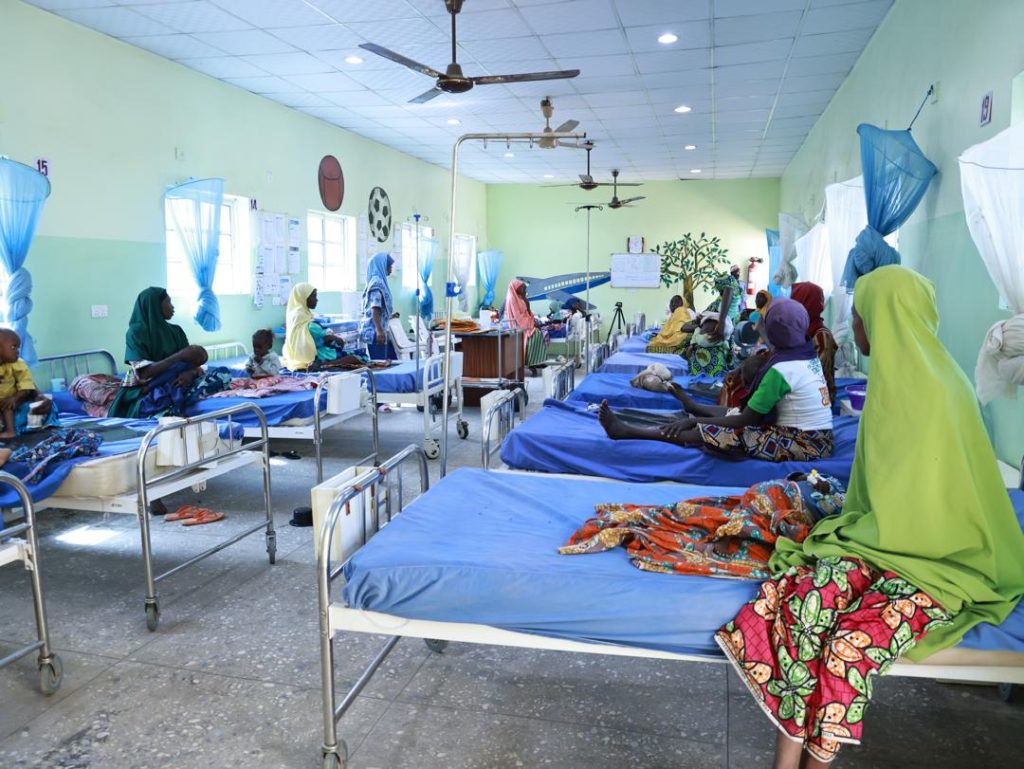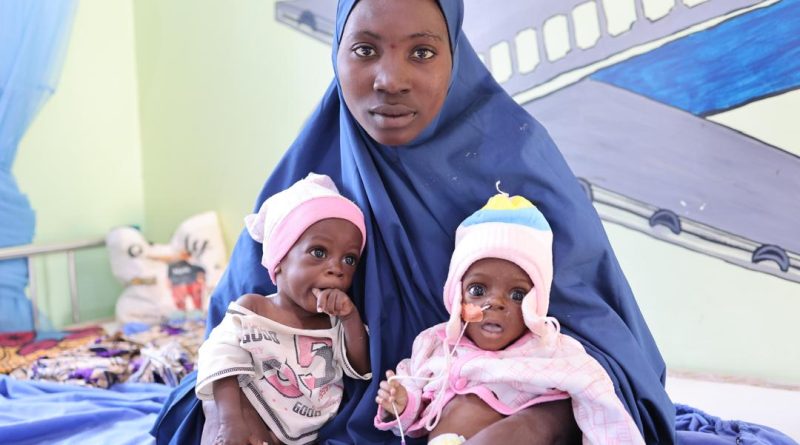Tackling Twin Peaks Of Malaria And Malnutrition In Kano, Northwest Nigeria (A Statement By MSF)
By Bukar BOLORI
Zuwaira Muhammad, 26, sits on a hospital bed at the Inpatient Therapeutic Feeding Centre (ITFC) at the Unguwa Uku Primary Healthcare Centre in Kano, northwest Nigeria.
Here, Médecins Sans Frontières (MSF) offers critical treatment to children suffering from malnutrition.
By her sides, lie her 10-month-old twins—Safwan, a boy, sleeping peacefully on her right, while Safuna, a girl, lying on her left-hand side is currently receiving a blood transfusion.
Safuna is one of the over 40,000 children treated for malnutrition in Kano in 2024.

The children brought to MSF-supported facilities primarily come due to malnutrition but upon screening, most of them are found to also have malaria.
From January to May 2024, about 9,000 out of the 14,000 children diagnosed with malnutrition tested positive for malaria after screening.
Malaria and malnutrition have a complex relationship, with malnutrition increasing the risk of malaria and malaria increasing the risk of malnutrition.
This relationship can lead to a cycle of malnutrition and malaria, which can be especially harmful to children under five.
“Malaria can reduce appetite and make it harder for the body to absorb nutrients, leading to malnutrition. Conversely, malnutrition can weaken the immune system, making children more susceptible to infections like malaria,” says Dr. Yanu Mbuyi, MSF Medical Coordinator in Nigeria.
Malaria is one of the leading causes of death in Nigeria.
According to the WHO’s 2024 World Malaria Report, Nigeria accounts for 26 percent of malaria cases globally.
Kano state contributed an estimated nine percent of Nigeria’s 68 million malaria cases in 2021 and 30 percent of admissions to Nigeria’s hospitals are because of malaria.
Our teams in Kano have observed a distressing increase in the number of children suffering from malnutrition, as evidenced by the rise in admissions.
In 2022, MSF treated 7,798 children for malnutrition; that number rose to 23,800 in 2023 and 46,304 in 2024.
“What we had in 2024 was a twin peak of malaria and malnutrition with 36,546 confirmed cases of malaria, the highest number recorded since we started working in Kano”, says Dr. Hemmed M Lokonge, the MSF Project Coordinator in Kano.
In response to the rising rates of malnutrition, MSF expanded its operations by opening additional outpatient treatment facilities in Kumbotso, and Rijiyar Lemo, alongside the already established one in Unguwa Uku.
During the malnutrition crisis, the 75-bed inpatient facility in Unguwa Uku reached full capacity, prompting the opening of an additional 90-bed centre at Murtala Mohammed Specialist Hospital.
This was full in just two hours.
“Safuna is feeling better now compared to when I brought her here a few days ago,” Muhammad says, having travelled over 40 kilometres from Wudil to access MSF services.
“She was weak and could hardly move, but now she has more energy and can even laugh.”
MSF activities in Kano, which began as a response to the COVID-19 pandemic, evolved to include general outpatient department support and response to the growing malnutrition crisis.
Presently, MSF is the only organisation providing inpatient therapeutic feeding services in Kano, with patients coming from 37 out of the 44 local government areas (LGAs) in the state, as well as from neighbouring states.
Since 2022, MSF has consistently raised concerns about the increasing number of children admitted for malnutrition at its facilities across northern Nigeria.
In 2024, our teams treated over 357,000 children who were suffering from malnutrition in the facilities where we are working in the north.
This is an increase of 35 per cent compared to the 265,500 children treated in 2023.
Among those treated in 2024, 75,000 required inpatient care, while 282,000 received outpatient treatment.
In 2024, the surge in malnutrition cases began as early as March, well before the usual peak season in July, and extended through November, a time when cases are typically expected to decline.
This situation raises fears that the severity of malnutrition in 2025 could exceed that of previous years.
The persistent malnutrition crisis in northern Nigeria stems from a variety of factors such as inflation; food insecurity; insufficient healthcare infrastructure; ongoing security issues, and disease outbreaks worsened by low vaccine coverage.
Tackling acute malnutrition in northern Nigeria requires a multi-faceted approach.
Immediate measures include strengthening healthcare facilities to diagnose and treat malnutrition.
Additional steps involve reinforcing vaccine programmes, enhancing access to nutritious food, improving water and sanitation, and raising awareness.
Currently, MSF operates outpatient clinics in only three Local Government Areas (LGAs) of Kano State: Tarauni, Fagge, and Kumbotso.
This limited geographical coverage is significant, considering that Kano State is made up of 44 LGAs.
It underscores the insufficient number of clinics available to address the large volume of children suffering from malnutrition.
MSF advocates for establishing outpatient feeding centres across all LGAs in Kano to enhance community-based management of malnutrition and reduce severe cases.
In 2025, MSF’s health promotion activities will shift focus to community education, empowering families to recognise early signs of malnutrition and address them before hospitalisation is necessary.
It is essential that health authorities, international organisations, and donors intensify their efforts to address the escalating malnutrition crisis in Kano and throughout northwest Nigeria—a region currently lacking sufficient humanitarian response, to prevent further lives from being lost in 2025.END




